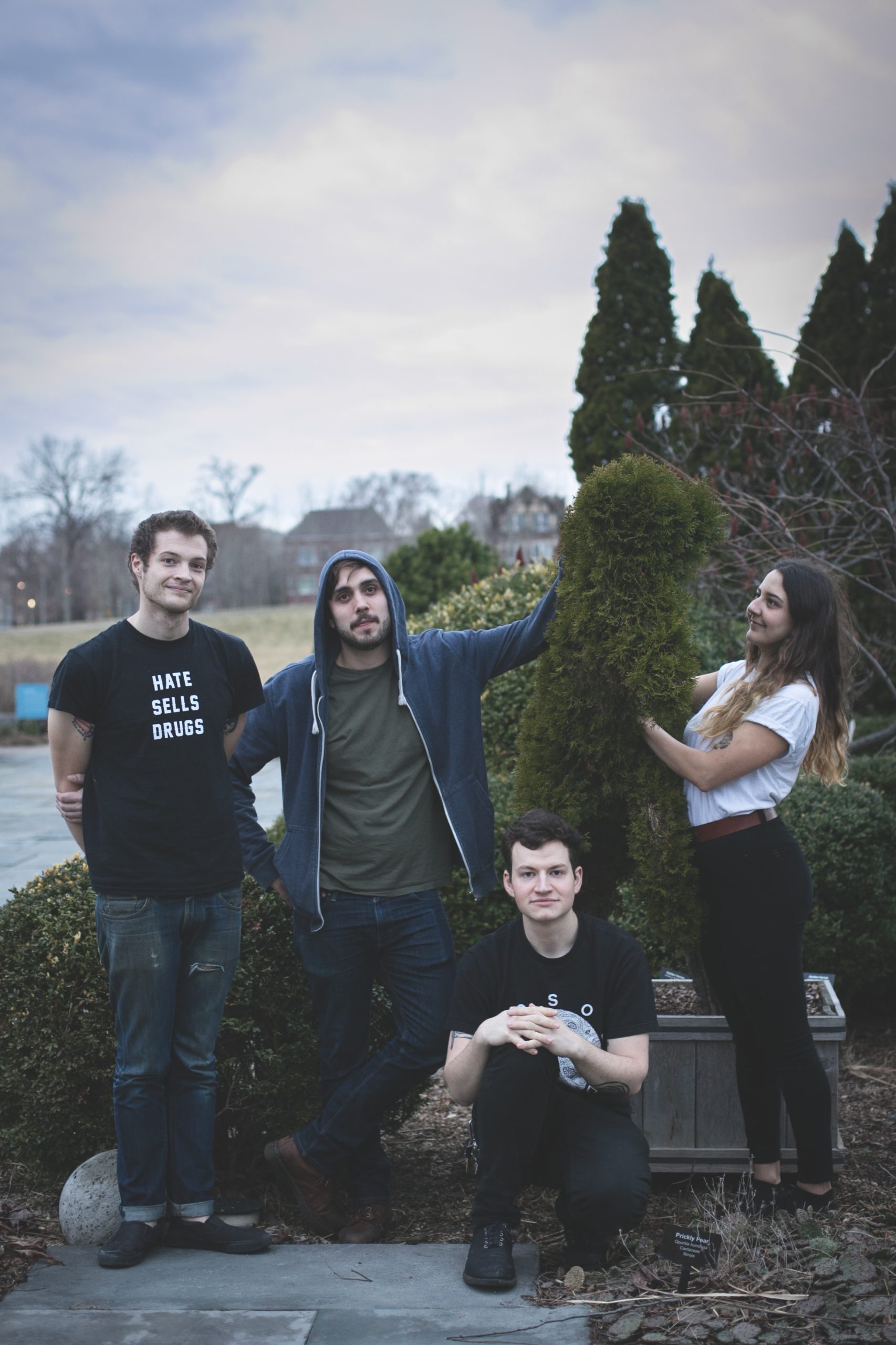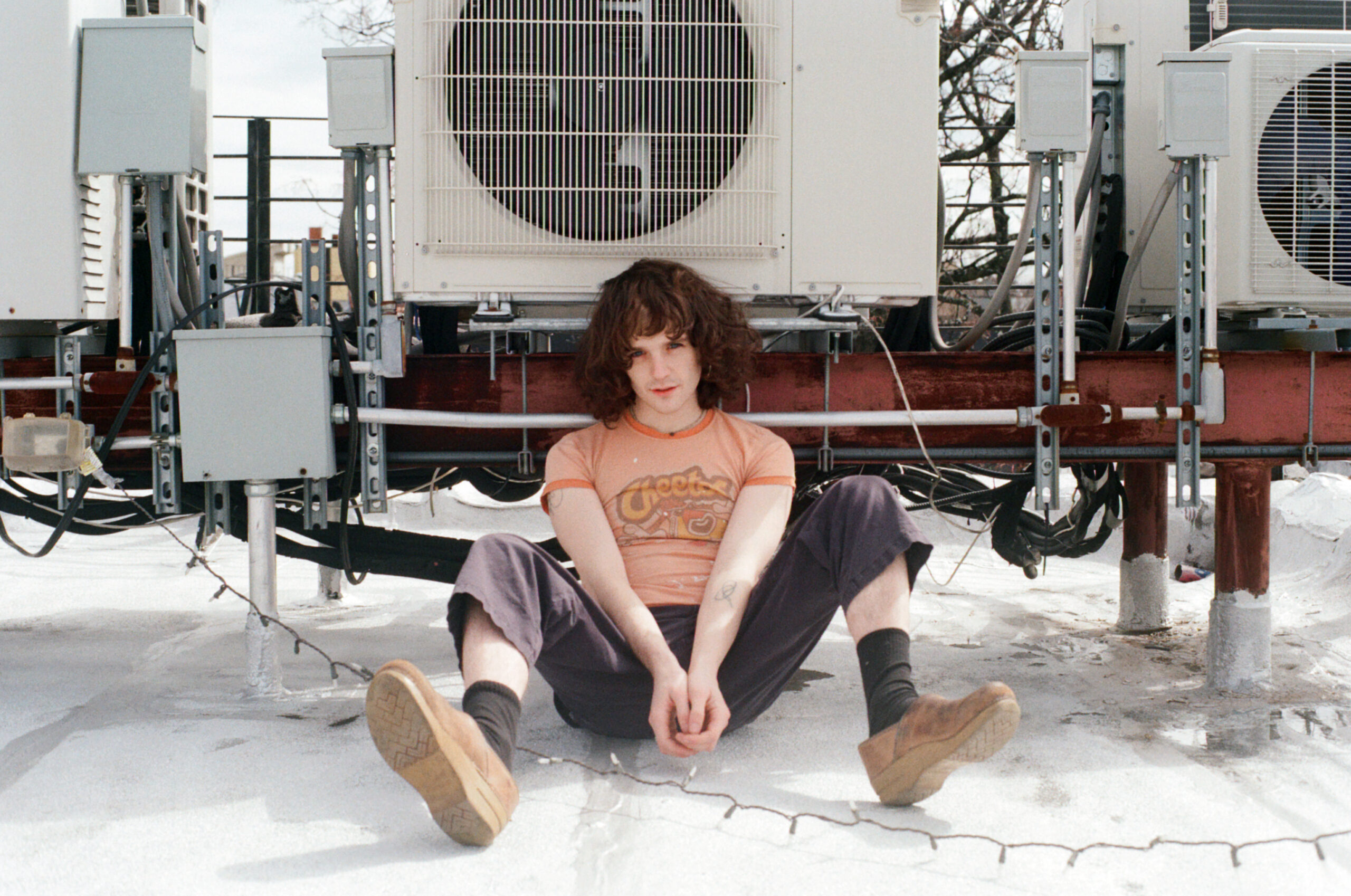Let's get one thing straight: Chicago's Slow Mass is not a side project. Although drummer Josh Sparks and guitarist Josh Parks both play in the touring version of Into It. Over It., the quartet treats this as a full-time band, and it's nothing short of a passion project. Each of the members comes from a very different background -- Sparks and Parks drummed and played guitar, respectively, in Former Thieves, guitarist/vocalist Dave Collis used to play in mathy punk group My Dad, and bassist/vocalist Mercedes Webb didn't even have much experience playing music beyond her solo work.
The result of these varying experiences Treasure Pains, a six-song EP that transcends genre and covers a lot of musical ground. Set for release a full year after the band's first shows, it's as interesting as it is hard-hitting, with some songs that embody the straight-up aggression of early Title Fight ("Bruce Lee"), and others that capitalize on the beautiful intricacies of the male-female vocal trade-off ("Nice But Not Kind").
Interestingly enough, the band’s inception is centered around a coffee shop in Chicago's Lincoln Park, where Webb, Parks, and Collis are all either currently or were recently employed. Despite its flaws, the shop is acceptable -- maybe even desirable -- as it's a job that allows the necessary time off for writing, recording, and touring that resulted in Treasure Pains and the band's subsequent full-length.
We’ve already heard "Dark Dark Energy" and "Portals To Hell," two of the heavier tracks off Treasure Pains, and today we’re happy to premiere the EP’s title track, which also serves as its closer. Check out the track, as well as our interview with the band, below.
STEREOGUM: How did you guys come together as a band?
DAVE COLLIS: It first started with me and the drummer Josh Sparks meeting and slowly getting to know each other over the course of summer 2014?
JOSH SPARKS: Yeah, I mean really summer 2013 into fall 2014 at this point.
COLLIS: Yeah, kind of knowing each other a little bit through that and becoming closer as friends. We started jamming in off-time between him on tour with Into It. Over It. The main band I was in at the moment was called My Dad, and we were slowly ending as I was starting this new thing with Josh. It eventually got down to being just me and him working on the songs, and then Parks came along because we knew we wanted to have another guitar, so that sort of changed things up. Then we spent a really long time looking for a bassist and vocalist and then Parks asked Mercedes at her birthday party.
MERCEDES WEBB: Yeah, Josh Parks and I work together at a cafe in Lincoln Park and I knew of Josh Sparks just through mutual friends, and I think I’d seen Dave around, but I didn't really know him. But yeah, Josh Parks came to my birthday and asked me about it and immediately sent me some songs and I think later that week I came to practice and auditioned, and they invited me in. And that was in April of last year.
COLLIS: We played our first show last September and the record is coming out a year after our first show, but the songs were already in early formation or the inception of the band had been a whole year prior to that, so the whole idea of the band will have existed for two years by the time the record comes out.
STEREOGUM: So where did the name Slow Mass come from?
COLLIS: It's actually a kind of nerdy Sonic Youth reference. There's this weird New York new wave composer dude named Glenn Branca, who's still doing stuff, but in the early '80s he was doing stuff with Thurston Moore and Lee Ranaldo, and there's one of his records that has Thurston Moore and Lee Ranaldo on it and the first composition on it is called "Slow Mass."
STEREOGUM: That's awesome. Mercedes, you said you worked in a cafe so I guess music isn't your full-time job. Do you all have day jobs, or is music a full time job for some of you?
WEBB: I've mostly worked at cafes or just in the service industry, and tried to get out of it, but I might have to go back in a year [LAUGHS]. Right now, I'm unemployed kind of. I've been picking up stuff at my uncle's restaurant, but it's not a full thing. I worked at coffee shops mostly, though, which is nice because it's a daytime thing and my nights are always free. You have to get up early, but whatever.
JOSH PARKS: I actually helped Dave get a job at that same cafe, and it's kind of funny that we all have the same connection to this cafe in Lincoln Park. It's kind of a weird work setting, but the owner doesn’t pay out employees really… [LAUGHS] It's really kind of fucked up. But it kind of attracts an interesting type of person that can deal with that. We bonded over that.
COLLIS: We all kind of liked food service for a while because it's a job that's really conducive to leaving whenever, which is good since a lot of us are often touring or traveling.
SPARKS: We’re all varying degrees of unemployed [LAUGHS].
STEREOGUM: So Dave and Josh wrote most of the songs before bringing in the other two members?
SPARKS: More skeletons.
COLLIS: I think all of the songs on the record have gone through ten different versions or little edits before the final piece. So while it did start with me and Sparks, it was nowhere near what the finished product was without Parks and Mercedes.
STEREOGUM: When you were writing, did the two of you sit in a room and write the songs together? Or did you write separately and get to practice and then work them out together?
SPARKS: Kind of both, actually. David had a few fully-formed skeletons, probably two and a half songs that were finished pieces that we should work from. The rest of it was largely ideas that David and I riffed on. We're a band that demos and records very, very heavily, so we sort of divide our time on being able to sit in a room and work to flesh things out and being able to take a break, hear a third person, and kind of intellectualize it and make changes to the song appropriately. So in that way, we did have the skeletons of the songs, but bringing in Josh Parks' and Mercedes' ears for counter-melodies is what has made these songs what they are.
STEREOGUM: Do you prefer getting in a room together to write or working with bits and pieces to put them together?
SPARKS: Getting in a room together!
COLLIS: Yeah, in the meantime since we recorded our EP, we've been working toward a full length. We'll set aside three-day blocks and all take off work and be in the practice space for eight, 10 hours of the day. Someone will have one riff that we’ll devote the whole song around, there might be a whole skeleton that we shade in all the parts. But it's definitely great having everyone being in the room and getting as much of a cohesive idea together, and then we'll each go off separately and work on those little elements of it and make some changes.
STEREOGUM: Who writes the lyrics mostly? Is that Dave?
COLLIS: Mostly it's me, yeah.
STEREOGUM: Lyrically, the song that immediately stuck with me was "Bruce Lee" because it's super aggressive. Is that a true story? If it is, would that be something you’d be comfortable talking about?
COLLIS: Yeah! A lot of the stuff that I write takes two different stories and blends them together to create its own narrative that borrows different elements. I saw this short documentary about… I guess it's in Czechoslovakia? There's this weird pseudo-homeless population that lives underground in the sewers that are run by a gang lord drug dealer who calls himself Bruce Lee. These people are the rejects of the society, but his role is sort of like a keeper to them, but he's also selling them heroin. So they’re extremely dependent on him and crippled by him, and they don't have a chance to get out of this awful situation. And the second element is based off… I was dating this girl at the time I was writing the song and she was telling me stories about being followed or stalked while living in Chicago. So the exterior element is the idea of feeling unsafe in a city, especially when you’re not a straight white dude.
STEREOGUM: Yeah, totally. Other than that, though, how did the atmosphere of Chicago play into the writing process? Because a lot of people say that the environment in which songs are written plays something of a character role in the songs. Did that happen for you?
COLLIS: I think in part. That song is slightly more specific than a lot of them. With a lot of the lyrics I write, I'll be on the bus and all of a sudden, eight sentences will come into my head and I’ll just jot them down on a piece of paper or on my phone. Then I’ll edit that over a period of several weeks. I guess the environment to create the lyrics is very important, but the lyrics are not necessarily tied to Chicago, or tied to specific environments.
STEREOGUM: How is this project different from everyone's other projects? Do you consider Slow Mass to be a side project or a full-time thing?
SPARKS: I think that’s how it is different. We’re all a part of a lot of things, but this is ours. By design, this is intended to be a collective. At this point, that is how we are carrying ourselves. That's why you're speaking to four of us on one telephone in the center of our practice space. That is absolutely the way that we're trying to carry this. So no, by no means is that a side project in that way. That term is really interesting to me when people use it. When bands get sick opportunities, they take them. Slow Mass right now is as full-time of a band as we're ever going to be, and if we continue to have cool shit happening and continue to get good offers, we're always going to say yes. But if not, we're also quite content to continue doing what we're doing.
COLLIS: Yeah, I find the dynamic and the writing process for this band quite different than anything else I've ever been involved with. We're all equally engaged and excited about what we're doing and we all have ideas for what we want to achieve, but no specific expectations to be let down on. The overall goal is to continue writing and working and bettering ourselves and whatever form it takes over a period of time is what it naturally will take.
STEREOGUM: What plan do you have after this release and tour? You mentioned a full length -- are you going to hit the ground running with that once you get back from tour or are you planning to get some of it done before you leave?
COLLIS: There's so many ideas floating around for songs, but we probably have 10 or 12 either close to completed or very skeleton-shaped ideas.
WEBB: Yeah, we have the meat of it.
SPARKS: We come back from tour and finish writing and trying to find a home for a full-length, try and get a full-length recorded. Then try to tour in support around that, that needs to occur. We're a band that's trying to make really good records. We're writing constantly and a full-length in the near future is definitely the next logical move.
WEBB: The coolest thing about this band has been the momentum. This has been the most challenging musical project. I don't have a lot of experience beside my own stuff. But it's been so cool to be brought into this. I hadn't even seen Josh for a while when he came to my birthday, and it all happened so fast. The momentum that we've had has been so cool: how many songs we've written together and how many connections that we've made through mutual friends. You could say, "We have 12 songs written, maybe we should stop." But I think that's the thing: We shouldn't stop because we have a lot of ideas and they're just going to keep coming as long as we keep the momentum up.
PARKS: That's one of the cool things about this project, too. We explore every single idea that anybody brings to the table. So it's a fun exercise.
STEREOGUM: Is there anything else you want to add?
SPARKS: One thing that wasn’t featured in any of the other articles is that 100 of the 500 pressing is going to have a special cover and all of the profits from that grouping of the pressing is going to be donated to Depression And Bipolar Support Alliance Of Greater Chicago.
STEREOGUM: Yeah, cool! Is there a specific reason that you feel passionately about that?
PARKS: We’re big proponents of breaking down the stigma of mental health.
SPARKS: There are a lot of social battles being fought right now, and I think it's bad that in 2016, people with mental illnesses are still stigmatized. Especially in punk and hardcore, there tends to be this view that we are impervious to certain biases. Obviously sexism sucks, but you tend to come down harder on people that are sexist at a punk or hardcore show because this scene doesn't have room for that. And I've noticed being in that circle that [mental illness] is still something that people are insensitive to just by way of ignorance. And it is a very accidental thing, it's because society does stigmatize it. People who openly suffer with those things can be viewed as lesser-than. I think it makes it difficult, too, because it makes this place where people don't have a chance to talk about the issues that they're feeling in an intelligible manner. There's not a lot of good middle ground for this discussion. It's a lot of people venting things on Facebook or not talking about it at all, and there should be more of a middle ground. That’s on a much more personal level -- as well as a societal and an infrastructural level -- in a place like Chicago. As a person that does suffer from bipolar disorder, and does need help, when I've looked into options, the disparity is going to group meetings at a library in Southside Chicago with people missing limbs from heroin injuries, or you’re looking at doing $1,500 a week for an inpatient program, and there is no middle ground. And funding and public awareness really are the only ways to bridge that disparity.
COLLIS: And [Depression And Bipolar Support Alliance Of Greater Chicago] is an organization that is specifically working with the greater Chicago area. Our first introduction to the world was through The Chicago Reader, so we wanted to give back something specifically to the city that we all live in.
//
Treasure Pains is out digitally on 9/9 and on vinyl on 9/26 via LandLand. Pre-order the 12" EP here and check out all of Slow Mass' upcoming tour dates here.






